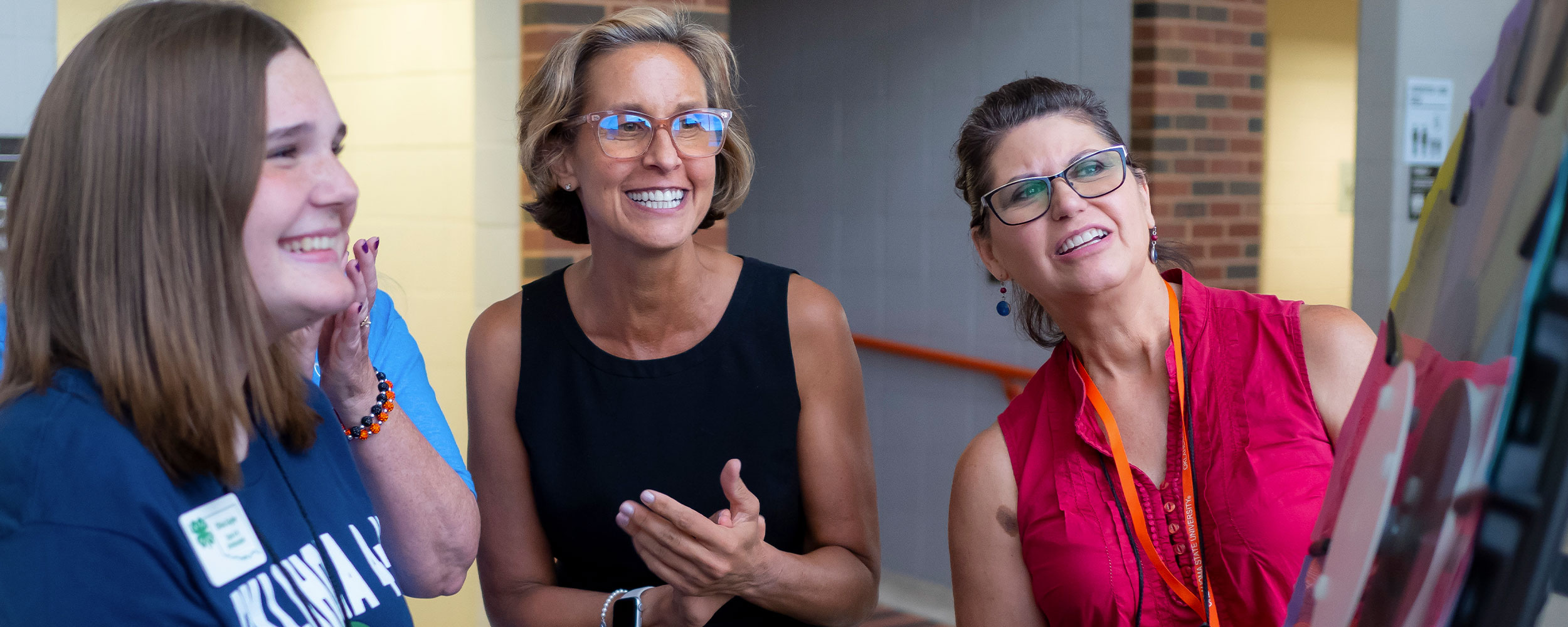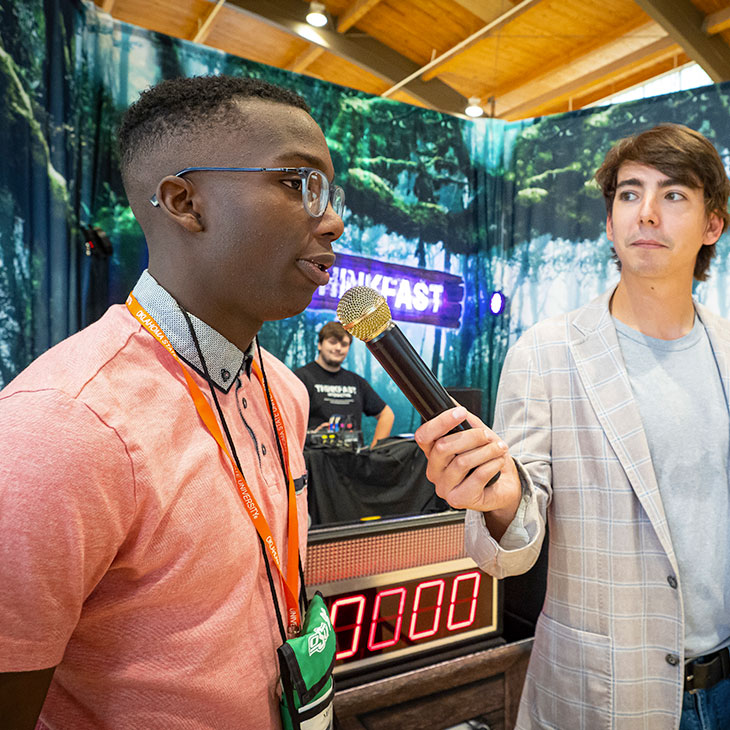
A Creative Approach: Peek seeks to impact lives and expand Family and Consumer Sciences outreach
Wednesday, November 30, 2022
Media Contact: Kirsi McDowell | Senior Communications Specialist | 405-744-9347 | kirsi@okstate.edu
When most think of a college class, they think of equations on a chalkboard or beakers in a lab, but for one department, dealing with the everyday facets life throws at you is their specialty.
Nestled inside the Oklahoma State University College of Education and Human Sciences, Family and Consumer Sciences (FCS) Cooperative Extension makes everyday life an exact science.
FCS works to positively impact the lives of all Oklahomans through outreach, engagement and research-based information. With a new leader in Dr. Gina Peek, FCS looks to increase its footprint across the state teaching critical life skills.
“People are our passion, we see ourselves as a college that really addresses the whole human, the whole person, and Family and Consumer Sciences is a big part of it,” said Dr. Jon Pedersen, dean of the College of Education and Human Sciences. “It is about how we learn and understand the family and what it means to be in the realm of a family unit.”
Peek — who was recently named associate dean for Extension, Engagement and Continuing Education as well as assistant director for Family and Consumer Sciences OSU Extension — sees FCS as a service unit across the college to provide engagement activities for the university and community.
OSU Extension is composed of four program areas — agriculture and natural resources, 4-H youth development, community and economic development and FCS.
As part of the OSU Extension administration leadership team, Peek leads the development of innovative programming, not only in Stillwater but also for people of all ages in all 77 counties in the state.
OSU Extension provides programs such as State 4-H Roundup, which brings kids to OSU’s campus for 4-H and FCS activities. Oklahoma
Home and Community Education (OHCE) events allow adult members to develop skills to
strengthen their families and use research-based information to solve issues facing
their communities. 
Through the College of Education and Human Sciences is a continuing education and professional development outreach program is Osher Lifelong Learning Institute (OLLI), which is designed for individuals 50 and older to travel and participate in social activities to enhance their lives.
Other FCS opportunities and resources range in topics from community nutrition education programs, family and child resilience, finance and job readiness education, health and hunger, Oklahoma Home and Community Education to safety and environment education programs.
“Dr. Peek’s role as program leader for family and consumer sciences helps to decide, with input from stakeholders and from our educators across the state, what the priorities are with respect to programming. For example, the kind of emphasis that goes on nutrition, housing or health programs,” said Damona Doye, associate vice president of OSU Extension. “Our state specialists have roles in curriculum development and provide professional development opportunities for our educators so their skills are up to date, and they have research-based information to share with stakeholders throughout the state.”
Modeling the land-grant mission — teaching, research and Extension — Peek takes the university to people in ways that are meaningful to them through service learning opportunities.
“My goal for OSU is to be the best Family and Consumer Sciences program in the United States,” Peek said. “That is an achievable goal.”
Extension can address the whole human not just in Stillwater or a particular region of Oklahoma but within the entire state to improve the totality of the human experience, Pedersen said.
“This is the unit to come to if you want to engage in service learning,” Peek said “If you want to go on a study abroad, this is the unit that you would come visit with. If I could diagram it out, faculty would come here, establish a process and then implement whatever it is they want to do.”
The sky's the limit for creative collaboration between faculty members and Peek’s team to help provide service opportunities.
“It's up to the faculty member to think critically about what service opportunities they would like to offer as part of a course, for example,” Peek said. “Then we can sit with them and help them work out any kind of details that need to be thought through.”
A large part of Peek’s role is bridging connections between OSU Extension and others within the university that don’t traditionally have Extension appointments, Doye said.
“One of the programs Dr. Peek helped lead last year was our EXCITE program that was funded nationally and provided support to all the land-grants who were interested across the country,” Doye said.
The Extension Collaborative on Immunization Teaching and Engagement (EXCITE) is a collaborative initiative to address health disparities among rural and other underserved communities.
“Partnering in those ways, as well as having funding from each of those different sources — local, state and federal — have mandated to a certain degree that there be these partnerships, but we all find value in them,” Doye said.
FCS Extension educators and state and area specialists attempt to provide solutions to the issues humans face daily such as health, hunger, environment, finances, family breakdown, jobs and employment, resilience, risky behaviors and safety.
These local educators are engaged with their community and can help partner with grant proposals to improve things like school crosswalks or nutrition education in at-risk families.
Anyone wanting to make changes on the local level and target specific issues, start with your local educators, Peek said.
“Another one of the relationships she's helping to develop is with a faculty member in kinesiology, who may have an interest in providing support for a program we've been without for a couple of years called AgrAbility,” Doye said. “It's designed to help people who may have had injuries or accidents that limit their abilities — for instance, farmers and ranchers — if they need adaptive equipment or other kinds of things.”
Doye and Peek are working to build new bridges with the OSU Center for Health Sciences in Tulsa. They aim to collaborate with entities such as the Center for Rural Health to bring some of their combined interest to local communities.
OSU-CHS is bringing telehealth kiosks to local communities on a pilot basis in a couple of places through the Rural Renewal Initiative, Doye said. If locals don't have access to primary care or other kinds of access to health providers, then the telehealth option may be something that's available to them. Doye and Peek are looking at ways they might help support or add to that service.
The establishment of more programs and the building of new relationships continue to better OSU’s FCS program.
Peek approaches her job strategically and holistically. Her vision for FCS is to be the best and the path to the top is paved by asking herself and her team what the long and short-term goals are for the next year.
One day at a time, step by step she is assembling a team and taking stock and articulating what they already do well. Then she plans to address what gaps need filled and increase programming to help fill those areas.
“I think collaboration has been a big part of FCS, institutionally from the beginning, because it's a partnership between local, state and federal,” Doye said. “That means we collaborate across county lines in terms of developing program-sharing programs.”
Peek and Pedersen’s goals align — being the preeminent leader within the nation for FCS.
No matter the level, FCS wants to provide opportunities for all humans in a fun way that also makes them successful, Peek said.
“She has a ‘why’ and it's clear when you talk to her of her ‘why.’ I think that's the most important thing about Gina,” Pedersen said. “She knows where her passion is, she has a clear vision and sense of direction of her ‘why’ and what she wants to accomplish and how she wants to impact lives.”
Story By: Sydney Trainor | ASPIRE Magazine
Photos By: Todd Johnson
